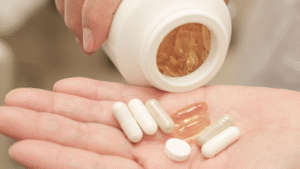Table of Contents
Navigating Confusing Pregnancy-Safe Foods Guidelines
Pregnancy is full of changes, but one of the biggest challenges can be figuring out which foods are truly safe to eat. Many expectant mothers feel frustrated by strict rules about sushi, deli meats, soft cheeses, and even eggs.
At the same time, they are encouraged to take multiple supplements daily to cover key nutrients like folate, iron, and omega-3s. It’s understandable to wonder why food, our most natural source of nutrients, seems so restricted.
The truth is that many guidelines around pregnancy-safe foods in the United States are based on caution rather than clear evidence. Concerns about listeria, salmonella, and mercury are real but often overstated. It’s easy to feel stuck between wanting to protect your baby and feeling limited in your choices.
Why Food Recommendations Feel So Restrictive
Foodborne illnesses like listeria and salmonella can pose serious risks during pregnancy. Because of this, guidelines often suggest avoiding raw fish, undercooked eggs, deli meats, and unpasteurized cheeses.
However, research shows that the absolute risk of contracting listeria from foods like sushi or soft cheese is very low, especially if you source high-quality, fresh ingredients (Boer et al., 2018).
At the same time, fresh fruits and vegetables are encouraged even though they have also been subject to contamination recalls. This contradiction leaves many women confused about which risks are acceptable and which are not.
Supplements: Helpful, But Not the Whole Answer
Prenatal vitamins are strongly recommended because they provide essential nutrients that support a baby’s development. For example, folate (or folic acid) helps prevent neural tube defects, and iron supports increased blood volume during pregnancy (Ocké et al., 2015). Omega-3 fatty acids, particularly DHA and EPA, contribute to brain and eye development in babies (Shepherd et al., 2022).
While these supplements are valuable, they should complement a balanced diet rather than replace whole foods. Nutrients from real food are often better absorbed, and whole foods provide additional vitamins, minerals, and phytonutrients that supplements alone cannot.
For many women, a high-quality prenatal vitamin paired with an omega-3 supplement can be a practical way to ensure key nutrients are covered, especially on days when appetite or food choices feel limited. If you’re considering adding these to your routine, look for products that are third-party tested for purity and safety.
Making Evidence-Based Food Choices
Not every guideline applies equally to every woman. Some expectant mothers, after reviewing research and discussing with their healthcare providers, choose to include foods like sushi from trusted sources, soft eggs, or medium rare steaks from high-quality meats.
The key is to weigh the risks and benefits, know the source of your food, and handle and prepare food safely.
Practical tips include:
- Buying sushi or raw fish only from reputable restaurants or markets with high turnover
- Cooking eggs until the whites are firm but the yolks may remain soft if using pasteurized eggs
- Choosing deli meats sliced fresh at a deli counter rather than prepackaged varieties
- Washing all fruits and vegetables thoroughly and avoiding pre-cut bagged produce
When in doubt, discuss your personal choices with your healthcare provider. They can help you find a balance that feels both safe and satisfying.
Why Whole Foods Still Matter
Research continues to show that diets rich in whole foods provide better overall nutrition during pregnancy than supplements alone (Boer et al., 2018). While supplements fill in the gaps, food should be the foundation.
Whole foods offer a wide array of nutrients that work together in ways scientists are still discovering. Even when following safety guidelines, it’s possible to enjoy a diverse diet with plenty of nutrient-rich options like cooked seafood, eggs, beans, leafy greens, and whole grains.
Building meals around these foods can make pregnancy nutrition feel less like a list of “don’ts” and more like an opportunity to nourish both you and your baby.
A Word From Vitamins For Woman
Pregnancy-safe foods don’t have to mean a joyless diet. With the right information and support, you can make choices that feel both safe and satisfying. Supplements like a quality prenatal vitamin and omega-3 can provide a safety net, but they are most powerful when paired with a wholesome, varied diet.
Every woman’s comfort level with food choices will be different. Trust your instincts, discuss your plans with your healthcare provider, and focus on nourishing your body in ways that work best for you. Pregnancy is a journey, and finding balance is one of the most empowering steps you can take.
Boer, A. et al. (2018). Dietary supplement intake during pregnancy. Maternal & Child Nutrition. https://pubmed.ncbi.nlm.nih.gov/29567330/
Ocké, M. C. et al. (2015). Maternal dietary supplement use during pregnancy. Nutrition Bulletin, 40(4), 425-432. https://pubmed.ncbi.nlm.nih.gov/27544304/
Shepherd, E. et al. (2022). Omega-3 long-chain polyunsaturated fatty acids during pregnancy. Journal of Midwifery & Women’s Health, 67(5), 590-599. https://pmc.ncbi.nlm.nih.gov/articles/PMC12046255/












